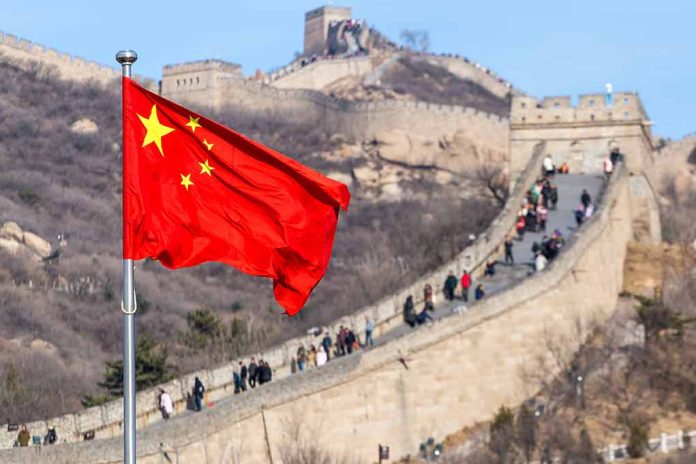
Secretary of State Marco Rubio announces sweeping visa revocations for Chinese students with ties to the CCP, in what critics call the most aggressive anti-espionage action since the Cold War.
Key Takeaways
- The U.S. will “aggressively revoke” visas for Chinese nationals with ties to the Chinese Communist Party or those studying in critical STEM fields that impact national security.
- The policy targets approximately 275,000 Chinese students in the U.S., with over 110,000 in math, engineering, science, and technology programs considered high-risk for espionage.
- Critics warn the crackdown could harm U.S. universities financially, as international students contributed $43.8 billion to the U.S. economy last year.
- Security experts support the measures, citing China’s laws that require citizens to assist state intelligence operations when requested.
- The Trump administration has identified multiple incidents of alleged Chinese espionage at prestigious American universities.
Trump Administration’s Hardline Stance on Chinese Academic Espionage
The Trump administration has implemented its most aggressive countermeasure yet against what officials describe as systematic Chinese espionage in American academic institutions. Secretary of State Marco Rubio announced plans to revoke visas for Chinese students with connections to the Chinese Communist Party, particularly targeting those in sensitive fields related to national security. This decision comes amid growing evidence of coordinated intelligence collection activities on U.S. campuses, where approximately 275,000 Chinese students currently study, down from a peak of 370,000 in 2019.
This crackdown specifically targets students in fields considered critical to American technological advantage, including science, technology, engineering, and mathematics (STEM). Over 110,000 Chinese students in the U.S. are currently enrolled in these sensitive disciplines, which the administration believes present the highest risk for intellectual property theft and espionage. The State Department, working with Homeland Security, is also revising visa criteria for future applications from China and Hong Kong to ensure tighter security protocols.
🚨 𝗦𝘁𝗮𝘁𝗲 𝗗𝗲𝗽𝗮𝗿𝘁𝗺𝗲𝗻𝘁 𝗦𝗮𝘆𝘀 𝗜𝘁 𝗪𝗶𝗹𝗹 𝗘𝘅𝗽𝗮𝗻𝗱 𝗦𝗰𝗿𝘂𝘁𝗶𝗻𝘆 𝗼𝗳 𝗔𝗹𝗹 𝗖𝗵𝗶𝗻𝗲𝘀𝗲 𝗩𝗶𝘀𝗮 𝗛𝗼𝗹𝗱𝗲𝗿𝘀 𝗶𝗻 𝗨𝗦
The State Department has made several shifts to visa policies this week.
On May 27, the department confirmed Secretary of State… pic.twitter.com/pzdUTAaTz3
— The Epoch Times (@EpochTimes) May 30, 2025
Evidence of Espionage and National Security Concerns
Federal intelligence agencies have documented numerous cases of alleged Chinese espionage at American universities in recent years. Former FBI Director Christopher Wray previously warned Congress that China was “exploiting our open academic environment for research and development,” highlighting how the CCP targets American innovation through both direct and indirect means. The Chinese government’s national intelligence law, which requires citizens to assist state intelligence operations when requested, has raised particular concerns about the loyalties of Chinese nationals studying in fields with military or dual-use applications.
“The Chinese Communist Party continues to utilize ‘non-traditional’ collectors… who oftentimes become unwitting tools for the CCP and its intelligence apparatus,” said Bill Evanina, a former Counterintelligence Director.
Representative John Moolenaar has been particularly vocal about these security risks, describing the student visa program as a “Trojan horse” for Beijing to access sensitive technologies. Harvard University, meanwhile, has filed a lawsuit against the Trump administration after having its student visa certification revoked, with ICE Acting Director Todd Lyons citing the university’s foreign donations and collaborations with Chinese entities as cause for concern.
Support and Criticism of the New Policy
Security experts have largely praised the administration’s decisive action. Gordon Chang, senior fellow at the Gatestone Institute, endorsed the visa ban as a necessary step to disrupt China’s systematic theft of American intellectual property. The policy targets not just current but potential future espionage, with Chang emphasizing that Chinese nationals are legally obligated under Chinese law to spy if requested by the CCP, creating an inherent security risk regardless of individual intentions.
“aggressively revoke,” Secretary of State Marco Rubio stated, describing the administration’s approach to Chinese student visas connected to the CCP.
Critics, however, have raised concerns about both economic impacts and potential racial profiling. International students contributed nearly $44 billion to the U.S. economy last year and supported approximately 400,000 jobs. The Chinese Ministry of Foreign Affairs called the policy “fully unjustified” and warned it would damage America’s reputation among international students. University administrators worry about losing valuable tuition revenue and research talent, while civil liberties advocates question how the government will determine CCP ties, noting that many Chinese join the party for career advancement rather than ideological reasons.
The Broader Context of U.S.-China Relations
This visa crackdown represents one component of President Trump’s comprehensive strategy to counter Chinese influence and protect American technological advantages. The policy also highlights the complex relationship between academic freedom and national security concerns. Many top CCP officials, including President Xi Jinping, have sent their children to American universities, creating diplomatic sensitivities around implementing these restrictions. The revocation process will likely proceed on a case-by-case basis, with priority given to students in the most sensitive fields and with the clearest ties to Chinese military or intelligence entities.
“serious concerns,” said ICE Acting Director Todd Lyons regarding Harvard’s foreign donations and collaborations with Chinese entities that led to visa revocation.
The administration maintains that while the policy may create short-term disruption for universities, it addresses a critical national security vulnerability that has been exploited for decades. Universities are being advised to strengthen their research security protocols and enhance scrutiny of international collaborations, particularly with entities connected to the Chinese government or military. The State Department has indicated it will work with academic institutions to implement these changes while minimizing disruption to legitimate academic exchange.



